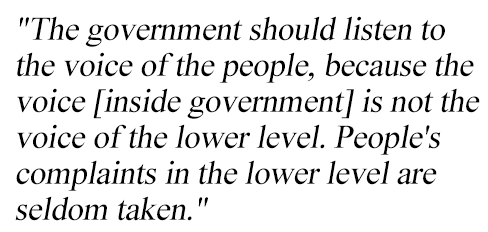
ISSUE #22
APRIL 2024
Emerging Common Ground on Artificial Intelligence Policy
As the House’s new Task Force on Artificial Intelligence considers how government should address AI issues, such as deepfakes in the election and bias in algorithms, a new Program for Public Consultation survey of 3,610 registered voters finds very large bipartisan majorities favor giving the federal government broad powers to regulate Artificial Intelligence (AI). They support seven proposals currently under consideration in government for regulating AI-generated deepfakes and AI making decisions with the potential for harm.
- Prohibit the use of deepfakes in political campaign advertisements, such as to depict an opponent saying something they did not, or an event that did not occur. (National 84%, Republicans 83%, Democrats 86%)
- Prohibit the public distribution of any pornographic deepfake made without the consent of the person being depicted. (National 86%, Republicans 85%, Democrats 87%)
- Require that all deepfakes shared publicly be clearly labeled. (National 83%, Republicans 83%, Democrats 85%)
- Require AI programs pass a test before putting to use, which would evaluate whether they may violate regulations, make biased decisions, or have security vulnerabilities. (National 81%, Republicans 76%, Democrats 88%)
- Allow the government to audit programs that are in use, and require the AI company to fix any problems that are found. (National 77%, Republicans 74%, Democrats 82%)
- Require AI companies to disclose information to the government about how the decision-making AI was trained, if requested, to aid with pre-testing and audits. (National 72%, Republicans 67%, Democrats 81%)
- Creating a federal agency for AI to enforce regulations, oversee AI development and provide guidance on AI policy. (National 74%, Republicans 68%, Democrats 81%)
- Internationally, American voters favor:Creating an international regulatory agency for large-scale AI to develop and monitor international standards. (National 77%, Republicans 71%, Democrats 84%)
- .Creating a treaty to prohibit the development of weapons that can use AI to fire on targets without human control (National 81%, Republicans 77%, Democrats 85%).
To learn more, we recommend PPC’s full report.
Danielle Allen: Supermajority Needed to Bolster American Democracy
In a recent column in The Washington Post, Danielle Allen called for Americans to join together in a supermajority to support “core norms” of American democracy. Allen argued that the key to renovating democracy lies in creating a cross-ideological supermajority of more than two-thirds of voters who offer wholehearted support for strengthening constitutional democracy. She highlighted the need for listening to the people and big institutional changes to unstick the gears in our government, but acknowledged that such changes may feel out of reach. To achieve this, she suggested building a coalition around a commitment to constitutionalism, rule of law, full inclusion, nonviolence, and respect for elections and the will of the people. She emphasized the impact that supermajority support and cites several examples of state ballot initiatives where cross-ideological supermajorities have aligned to institute change.Voice of the People has identified more than 100 policy positions on a wide range of federal issues supported by supermajorities (2/3rds) of both Republican & Democratic voters, all issues on which Congress has been gridlocked, revealing far more common ground among the American people than in Congress.
New Studies Point Towards Increased Public Consultation to Overcome Gridlock
Research continues to confirm what many Americans know from experience, polarization is driven more by differences among elected officials than those among citizens. A recent Pew Research Center survey revealed citizens across 24 countries are calling for significant changes to improve democracy, such as: 1) better politicians who are competent, honest, and more responsive to the will of the people; and 2) the empowerment of citizens to contribute through direct democracy and public consultation. Another recent study by the Polarization Research Lab, based at Dartmouth, Stanford, and UPenn, shows a strong divide between the attitudes of citizens and elected officials, finding that “the American public, including Democrats and Republicans alike, strongly oppose anti-democratic actions and partisan violence.”


UK Labour Party Announces Support for Citizens’ Assemblies
Inspired by the “transformational” success of Citizens’ Assemblies in Ireland, the United Kingdom’s Labour Party has plans of addressing the housing crisis through implementing Citizens’ Assemblies, should they win their upcoming election. The Chief of Staff of the Leader of the Labour Party recently said the Labour Party plans to introduce Citizens’ Assemblies as a way to help find consensus on key policy issues from housing to constitutional reform.
Voice of the People Joins People Powered
Voice of the People recently joined People Powered, a global coalition and hub for participatory democracy. People Powered provides a multitude of resources for improving democracy, such as their Citizen Participation Best Practices toolkit. The coalition’s mission is to support citizen empowerment in government decision-making globally, by bolstering the organizations and governments that are investing in participatory democracy programs. “We deeply appreciate the mission of People Powered, and we look forward to adding our repertoire of public consultation expertise to the expanding catalog of organizations joining our powerful movement,” said JP Thomas, Vice President of Voice of the People.

Artificial Intelligence
Put yourself in the shoes of policymakers by trying our policymaking simulation on whether to regulate artificial intelligence. In this simulation, you’ll get a background briefing, learn the arguments for and against different proposals regarding regulating AI, and determine your recommendations. Once you finish the simulation, you’ll have a chance to send your recommendation to your Congresspeople.
